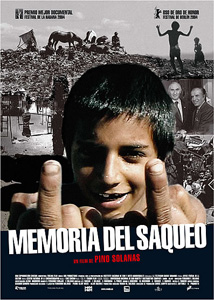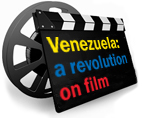Report of film screening “Memory of a plunder” in London
- 19 June 2008
About seventy people gathered yesterday, June 19, in London's Bolivar Hall for the second part of the film season Venezuela: a revolution on film, which is organised by Hands off Venezuela in association with the Venezuelan embassy in the UK. This time we viewed "Memory of a plunder" by the Argentinean film director Fernando "Pino" Solanas, which marked his return to social documentary filming.
 In this breathtaking documentary Solanas deals with what happened to his
country in the 1980s and 1990s. It describes the economic and social decline of
Argentina,
in the past the richest country on the Latin American continent. The
governments of Alfonsín, Menem and De la Rúa privatised nearly every state
owned company, including YPF, the oil and gas company, which was a motor of the
nation's wealth. "Everything that belongs to the state should be in private
hands" was the motto of President Carlos Menem, who came to power in 1989.
In this breathtaking documentary Solanas deals with what happened to his
country in the 1980s and 1990s. It describes the economic and social decline of
Argentina,
in the past the richest country on the Latin American continent. The
governments of Alfonsín, Menem and De la Rúa privatised nearly every state
owned company, including YPF, the oil and gas company, which was a motor of the
nation's wealth. "Everything that belongs to the state should be in private
hands" was the motto of President Carlos Menem, who came to power in 1989.
An alliance of foreign banks and multinationals, including Spanish, Italian, French, US and British companies, in collaboration with local capitalist groups, judges, politicians from all parties, generals and elements from the old dictatorship, divided the wealth of the country among themselves, with devastating effects for ordinary people. Millions of people became unemployed and sank into poverty, and malnutrition became widespread. Eventually in December 2001, after 3 years of recession, the Argentine financial system collapsed. The life savings of millions of people, who had worked their whole life to guarantee themselves a decent living when they retired, were frozen in the banks while at the same time multinationals took billions of dollars out of the country. Six months earlier the IMF had been presenting the "Argentinean miracle" as the example to follow for Latin America.
The people of Buenos Aires streamed out onto the streets in hundreds of thousands, protesting against the self-enrichment of the companies and demanding their money back. The mood and anger expressed itself in violent street protests, clashes with the police and several deaths. The events of December resulted in the overthrow of President De la Rúa. But the protests continued and in the following two weeks the country saw three more presidents.
The meeting then continued with a discussion led by Mario Rodriguez from the organisation Wayna Tambo from El Alto, Bolivia, and Jorge Martín, International Secretary of Hands Off Venezula. Mario Rodriguez said that with a few changes here and there the events in Argentina are similar to the history of every other Latin American country. Jorge Martín then stressed the point that the process of privatisation is also taking place here in Britain, and that it's time to name things by their real name, that so called neo-liberalism is in truth capitalism, and globalisation, which is a nice word, is imperialism. It's the capitalist system which causes misery for billions of people all over the world and that in his opinion it's time to move forward to socialism. This was then followed by questions and comments from the audience.
The next screening will take place on Wednesday July 9 with the film "Venezuela Bolivariana". This film examines the Bolivarian Revolution of Venezuela and its connection to the world-wide movement against capitalist globalisation.
Trailer of "Memory of a plunder"
{youtube}BNCeK4E6sqY{/youtube}
